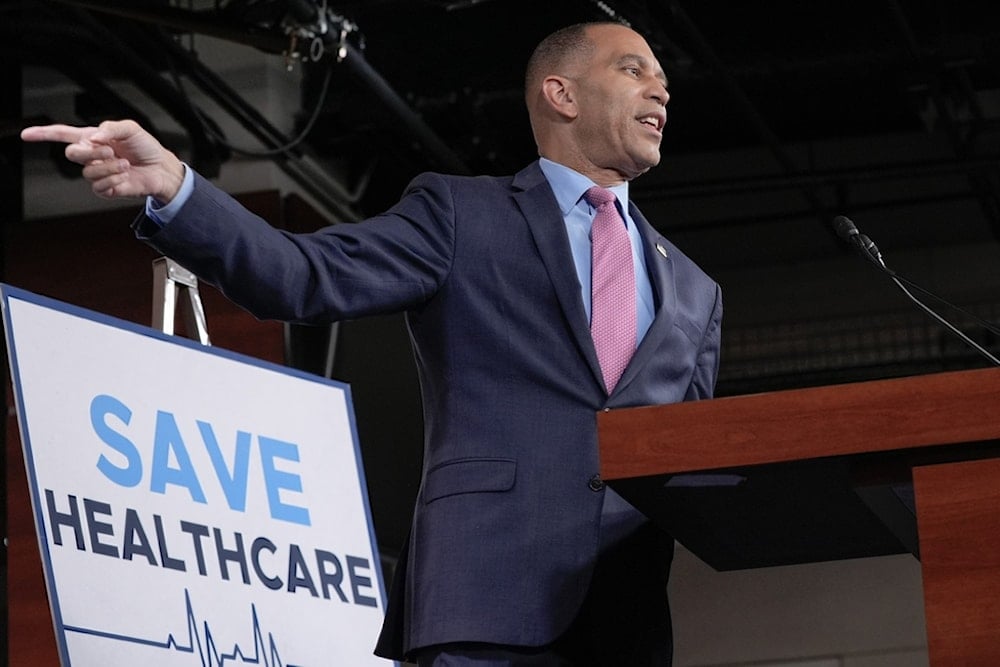US shutdown enters 5th day as White House prepares federal layoffs
On the fifth day of the US government shutdown, a standoff over Obamacare subsidies has escalated as Trump threatens permanent federal job cuts and freezes funding in Democratic states as negotiations remain stalled.
-

House Minority Leader Hakeem Jeffries, D-N.Y., speaks during a news conference during day 3 of the government shutdown on Capitol Hill, Friday, October 3, 2025, in Washington. (AP Photo/Mariam Zuhaib)
The United States is facing growing disruption as a partial government shutdown stretches into its fifth day, with Trump administration officials and Republican lawmakers warning that the effects on everyday Americans will soon intensify.
While most federal agencies remain shuttered, the White House has begun laying the groundwork for permanent layoffs of federal employees, a departure from the standard furlough approach that has historically accompanied such shutdowns. President Donald Trump has openly blamed Democrats for the escalating crisis, telling reporters Sunday, "It's taking place right now. It's all because of the Democrats. The Democrats are causing the loss of a lot of jobs."
At the heart of the deadlock is a bitter standoff over Obamacare health subsidies, but the conflict goes deeper, encompassing broader ideological disputes over federal spending, Medicaid cuts, and tax credits. Democrats are refusing to pass a Republican-backed stopgap funding bill unless it includes an extension of Affordable Care Act (ACA) premium support. Republicans, meanwhile, accuse Democrats of using the shutdown to extract partisan concessions.
The current crisis has taken a more aggressive turn, with the Trump administration freezing billions in federal funding for Democratic-led states, including money for public transit and green infrastructure projects. Critics have called the move a political punishment wrapped in a budget dispute. Meanwhile, agency websites have displayed partisan banners blaming "Radical Left Democrats" for the shutdown, drawing complaints over potential violations of federal ethics rules and the Hatch Act.
Shutdown power play
Government shutdowns are a periodic feature of divided Washington, usually resulting in non-essential federal employees being placed on temporary unpaid leave. This time, however, Trump has indicated a more aggressive posture, threatening job terminations rather than furloughs, a decision that would have lasting consequences for the federal workforce.
"It's going to get uncomfortable," Senator John Thune said on Fox News, noting that limited backchannel discussions were underway, including talks on potentially extending the ACA tax credits. Yet progress has been elusive. No formal negotiations have occurred since Monday, with Senate Republicans conceding that both sides remain, in Thune's words, "at a stalemate." When asked how long the shutdown could drag on, he replied, "Just as long as the Democrats want it to."
Democrats, however, argue that the shutdown reflects Republican intransigence, pointing out that the GOP controls both Congress and the White House. House Minority Leader Hakeem Jeffries stressed the real-world consequences of failing to renew the ACA credits: "If Republicans continue to refuse to extend the Affordable Care Act (Obamacare) tax credits, tens of millions of American taxpayers are going to experience dramatically increased premiums, co-pays and deductibles," he warned during an appearance on NBC's Meet the Press.
Shutdown echoes past
Public anxiety over the shutdown is mounting. According to a CBS News poll released Sunday, only 28% of Americans approve of how Republicans in Congress are handling the situation, with Democrats only marginally ahead at 27%. Nearly half of respondents said they were very concerned about the economic impact of the shutdown, with another third saying they were somewhat concerned.
The White House's National Economic Council director, Kevin Hassett, told CNN that officials remain "hopeful" for progress in the coming week. However, Trump has sounded less optimistic, signaling a willingness to let the shutdown continue as leverage.
The crisis has drawn comparisons to the record-breaking shutdown of 2018–2019, also under Trump's leadership, which lasted 35 days and cost the US economy an estimated $11 billion, according to the Congressional Budget Office. Today's standoff appears set to follow a similar path, with essential personnel working without pay, public services frozen, and a bitter political fight showing no signs of resolution.
Read more: Shutdown blame game: GOP fixates on imaginary 'radical left'

 4 Min Read
4 Min Read










